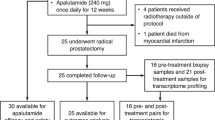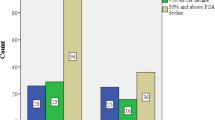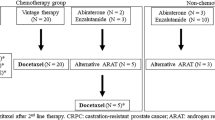Abstract
Forty patients with metastatic adenocarcinoma of the prostate were evaluated for response to treatment with aminoglutethimide plus cortisone acetate. All had relapsed from or failed to respond to primary endocrine treatment with orchidectomy or stilboestrol. Nineteen patients (48%) showed subjective response, in most cases relief of bone pain. Side effects limited treatment in only 3 patients. We conclude that aminoglutethimide plus cortisone acetate is a useful addition to the treatment available for this difficult group of patients. The mechanism by which this treatment has a beneficial effect remains unclear.
This is a preview of subscription content, access via your institution
Access options
Subscribe to this journal
Receive 24 print issues and online access
269,00 € per year
only 11,21 € per issue
Buy this article
- Purchase on SpringerLink
- Instant access to full article PDF
Prices may be subject to local taxes which are calculated during checkout
Similar content being viewed by others
Rights and permissions
About this article
Cite this article
Ponder, B., Shearer, R., Pocock, R. et al. Response to aminoglutethimide and cortisone acetate in advanced prostatic cancer. Br J Cancer 50, 757–763 (1984). https://doi.org/10.1038/bjc.1984.253
Issue Date:
DOI: https://doi.org/10.1038/bjc.1984.253
This article is cited by
-
Treating prostate cancer: a rationale for targeting local oestrogens
Nature Reviews Cancer (2007)
-
Insulin-like Growth Factor I and Urokinase-type Plasminogen Activator Bioregulation System as a Survival Mechanism of Prostate Cancer Cells in Osteoblastic Metastases: Development of Anti-Survival Factor Therapy for Hormone-Refractory Prostate Cancer
Molecular Medicine (2000)



